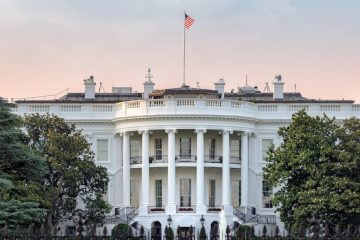Trump intensifies conflict with Harvard by threatening to revoke its tax-exempt status

President Donald Trump asserted that Harvard University would forfeit its tax-exempt status, intensifying his criticism of the Ivy League institution with a threat that has been condemned as beyond his authority. Trump announced the decision following several weeks of indicating a potential alteration to the tax-exempt status of the school. Analysts indicate that the revocation of Harvard’s tax-exempt status would entail a protracted procedure involving the Internal Revenue Service and potentially the judiciary, suggesting that the entire process could extend over several years. “We are going to be taking away Harvard’s Tax Exempt Status.” It is what they are entitled to! In a post early Friday morning, Trump articulated his views.
Harvard asserted that there exists “no legal basis” for revoking its tax-exempt status, while Trump’s announcement elicited immediate backlash. Charles Rettig, who held the position of IRS commissioner during Trump’s initial term, conveyed to Bloomberg News that the IRS would not permit itself to be weaponized. Rep. Richard Neal, the leading Democratic figure on the House’s tax-writing committee, characterized the action as unlawful. Four Democratic Senators, including Elizabeth Warren of Massachusetts, urged on Friday for an inquiry into whether Trump’s actions against Harvard contravene a criminal statute that prohibits the president from directing the IRS to penalize political adversaries or favor his supporters.
According to federal law, neither the president nor the vice president, nor their staff, are permitted to instruct an IRS official to “conduct or terminate an audit or other investigation of any particular taxpayer with respect to the tax liability of such taxpayer.” The ambiguity surrounding whether Trump’s announcement originated from his own decision or that of the tax agency remains evident. “I find it perplexing that the president appears to be functioning under the assumption that he possesses the authority to dictate this.” “He doesn’t and is specifically prohibited from doing this,” stated Steven Bloom, assistant vice president for government relations at the American Council on Education.
The authority to rescind tax advantages resides with the IRS, and the procedure is protracted, commencing with an audit, he stated. According to Bloom, Harvard would also have the opportunity to address any issues that may arise. Tenenbaum Law Group, a law firm located in Washington, DC, which specializes in representing nonprofits, stated in a report dated April 28 that the federal tax-exempt status cannot be revoked with a mere “stroke of a pen.” “Those procedures necessitate individual case-by-case IRS audits of each organization, providing ample opportunity for the entity to defend itself, and encompassing multiple avenues of appeal,” the law firm stated.
In recent years, conservatives have focused their criticism on Harvard and other prestigious universities, citing claims of ideological bias and raising concerns about an increase in antisemitism during campus protests related to the conflict in Gaza. Trump and other Republicans have alleged that the institutions are advancing liberal agendas and what they term “wokeness.” The White House, IRS, and Treasury Department refrained from providing any comments.
“The government has long exempted universities from taxes in order to support their educational mission,” a spokesperson from Harvard stated in an emailed communication. The institution indicated that the measure would lead to a reduction in financial assistance for students and the cessation of essential medical research initiatives. “The unlawful use of this instrument more broadly would have grave consequences for the future of higher education in America,” the statement indicated.
Approximately 1,700 private colleges function as nonprofit entities due to their societal contributions. The benefit is conferred under a specific provision of the tax code, which explicitly identifies education as a qualifying purpose for the exemption. Eliminating Harvard’s tax-exempt status entirely would impose a significant financial burden on the institution. Harvard’s tax-exempt status provides the institution with numerous advantages, including the exemption from conventional property taxes on its educational facilities. The issuance of bonds that offer interest exempt from federal taxes attracts investors, thereby facilitating a reduction in borrowing costs.
An analysis by Bloomberg News estimated that Harvard’s tax benefits amounted to a minimum of $465 million in 2023. The conflict between Trump and Harvard has intensified following the university’s refusal to comply with the administration’s requests for changes to campus policies. Harvard contends that these demands exceed their declared initiatives to address antisemitism and pose a risk to the institution’s autonomy. The administration has halted billions of dollars in funding that underpinned projects such as ALS and tuberculosis research, prompting Harvard to initiate legal action against several US agencies and high-ranking officials in response.
“There’s a process that has to be followed that would probably take a number of years,” stated James Repetti, a law professor at Boston College, during an interview prior to Trump’s announcement. “It would likely take a long time to work its way through the courts,” Repetti stated. The IRS has previously revoked a college’s tax-exempt status, a process that spanned several years. In 1976, Bob Jones University located in South Carolina forfeited its federal tax-exempt status due to its policies prohibiting interracial dating. The Supreme Court upheld the decision in 1983. Bob Jones University eliminated the policy in 2000 and subsequently restored its tax benefits in 2017. Analysts at JPMorgan Chase & Co. referenced the Bob Jones precedent in an April research note, stating that should the IRS attempt to revoke Harvard’s tax-exempt status, “we would expect immediate legal action, that could take years to resolve, extending beyond the current administration’s term in 2028.”
As the most affluent educational institution in the nation, Harvard possesses significant resources to mitigate unexpected challenges. It possesses impeccable credit ratings alongside a substantial endowment of $53 billion. In fiscal 2024, the institution generated $6.5 billion in revenue and recorded a surplus of $45 million. Harvard has recently undertaken measures to bolster its financial position by executing a $750 million taxable bond sale. Officials from the endowment have previously indicated plans to divest approximately $1 billion in private equity fund stakes.
Earlier this week, the university published anticipated reports on antisemitism and anti-Muslim bias, which revealed a troubling depiction of student interactions following the Hamas attack against Israel on October 7, 2023. “I apologize for the instances where we did not fulfill the elevated standards we justifiably established for our community,” stated Harvard President Alan Garber in a letter accompanying the reports. Garber has recognized the imperative to address antisemitism, indicating that he has encountered it firsthand during his tenure as the university’s leader, and stated that Harvard is dedicated to collaborating with the administration.
In recent weeks, the institution has placed the Harvard Undergraduate Palestine Solidarity Committee on probation and compelled the faculty leaders of the Center for Middle Eastern Studies to vacate their positions. Harvard has suspended its partnership with Birzeit University located in the West Bank and has rebranded its diversity, equity, and inclusion office to Community and Campus Life.










